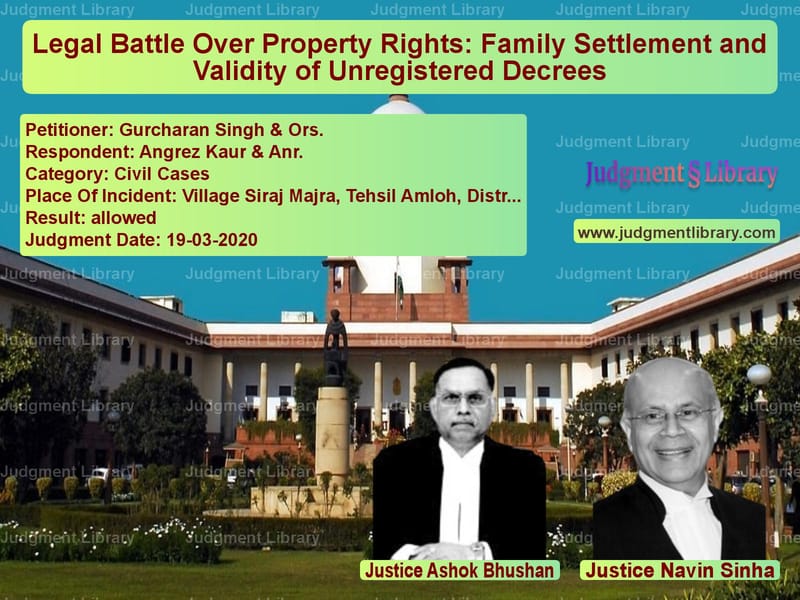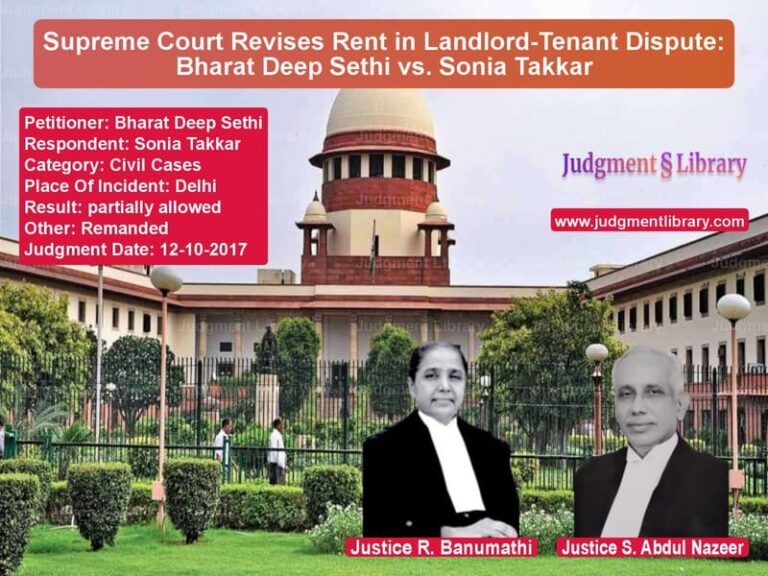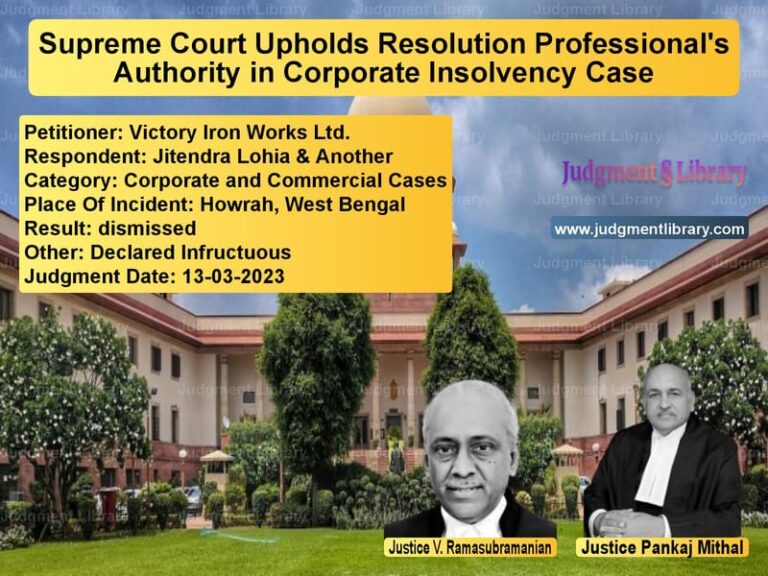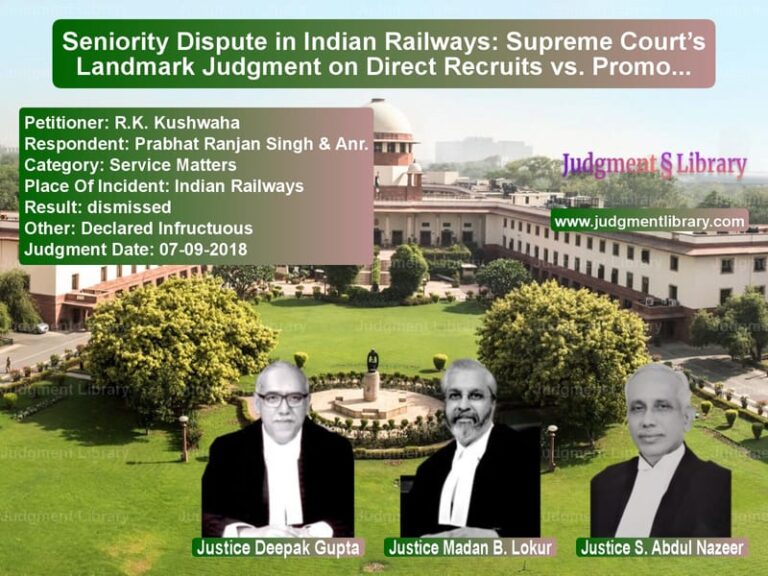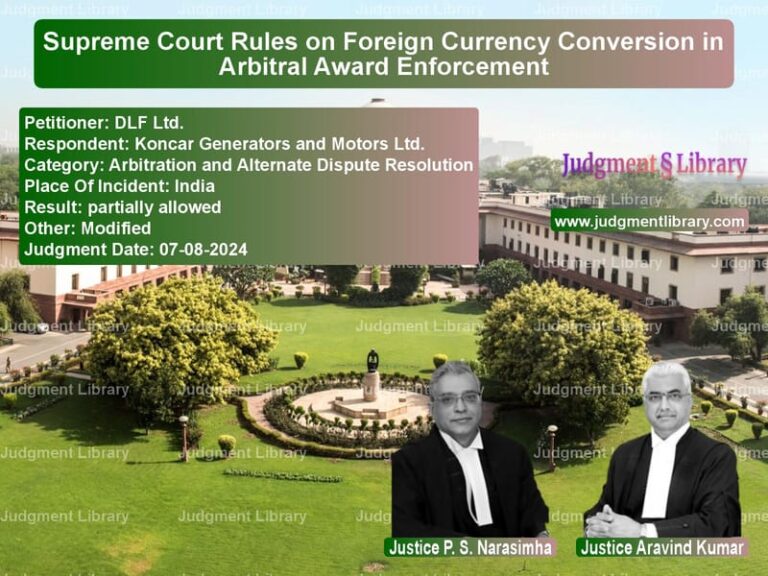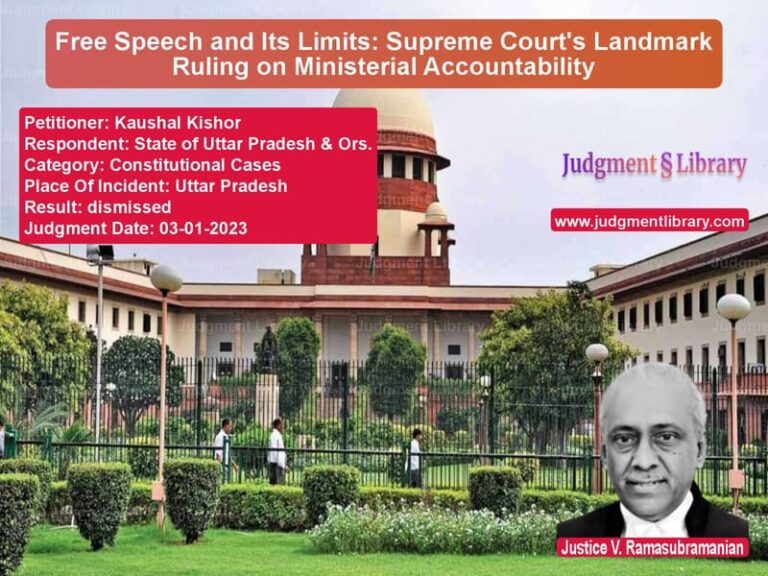Legal Battle Over Property Rights: Family Settlement and Validity of Unregistered Decrees
The case of Gurcharan Singh & Ors. v. Angrez Kaur & Anr. revolves around the inheritance of property after the death of Bhajan Singh. The dispute highlights key legal aspects related to family settlements, the validity of an unregistered court decree, and the necessity of proving a Will. The Supreme Court examined whether the decree granted in favor of the appellants required registration and whether it was obtained through fraud.
The appellants claimed ownership of the disputed property based on a registered Will executed by Bhajan Singh and a subsequent decree passed in their favor. The respondents, who were Bhajan Singh’s daughters, challenged the decree, arguing that it was obtained fraudulently and was not legally binding since it was not registered under Section 17 of the Registration Act, 1908. The Supreme Court ultimately ruled in favor of the appellants, holding that the decree was valid and did not require registration.
Background of the Case
The dispute originated in Village Siraj Majra, Tehsil Amloh, District Fatehgarh Sahib, where Bhajan Singh owned agricultural land. Bhajan Singh was married to Gurmail Kaur, and they had two daughters, Angrez Kaur and Paramjit Kaur. On September 15, 1973, Bhajan Singh and Gurmail Kaur obtained a written divorce. After the divorce, Gurmail Kaur moved to Village Jalowal with her daughters and lived with Maghar Singh, Bhajan Singh’s brother.
Bhajan Singh, on the other hand, continued to reside in Village Siraj Majra with the appellants—Gurcharan Singh, Gurnam Singh, and Kulwant Singh—who looked after him. On September 2, 1986, Bhajan Singh executed a registered Will in favor of the appellants. In 1994, the appellants filed Civil Suit No. 556 seeking a declaration that they were the rightful owners of the property. Bhajan Singh, the sole defendant in the suit, admitted the claim and requested the court to pass a decree in favor of the appellants. Consequently, the court decreed the suit on January 9, 1995, and the land mutation was transferred to the appellants on March 3, 1995.
After Bhajan Singh’s death on April 24, 1998, his daughters filed Civil Suit No. 167 on May 19, 1998, challenging the decree and asserting their inheritance rights. They argued that the decree was illegal, null and void, and obtained fraudulently.
Key Legal Issues
- Whether the decree obtained by the appellants in 1995 required registration under Section 17 of the Registration Act, 1908.
- Whether the decree was obtained fraudulently by misrepresenting the relationship between the parties.
- Whether the Will executed by Bhajan Singh was legally valid and proved according to law.
Arguments of the Appellants
The appellants, represented by senior counsel, argued that Bhajan Singh had voluntarily executed the Will and later confirmed his intent through a family settlement and court decree. They contended that:
- The Will dated September 2, 1986, was valid and executed by Bhajan Singh of his free will.
- The decree dated January 9, 1995, was passed based on Bhajan Singh’s written statement and oral admission in court.
- There was no fraud or coercion in obtaining the decree, as Bhajan Singh had willingly admitted the appellants’ ownership.
- Under Section 17(2)(vi) of the Registration Act, 1908, the decree did not require registration as it was based on a pre-existing right.
- Family settlements do not require blood relations between parties; Bhajan Singh lived with and was cared for by the appellants, making the settlement valid.
Arguments of the Respondents
The respondents argued that the decree was fraudulent and that they were the rightful legal heirs. Their key contentions included:
- The decree dated January 9, 1995, was obtained through fraud and misrepresentation, as the appellants falsely claimed to be Bhajan Singh’s nephews.
- The decree required registration under Section 17 of the Registration Act, as it created new rights in favor of the appellants.
- The Will was not properly proved in court, as one of the attesting witnesses was alive but was not produced.
- Since family settlements are only valid among blood relatives, the so-called settlement was legally invalid.
Supreme Court’s Observations
The Supreme Court examined whether the decree required registration and whether the respondents had successfully proven fraud. The Court ruled:
“We, thus, are of the considered opinion that decree and order dated 09.01.1995 did not require registration and were fully covered by Section 17(2)(vi), which contains exclusion from registration as required in Section 17(1).”
The Court further observed:
“The divorce between Bhajan Singh and Gurmail Kaur took place on 15.09.1973, and thereafter for 25 years, Bhajan Singh lived away from his wife and daughters. The defendants took care of Bhajan Singh, and it was of his own volition that he wanted to give the property to them.”
Final Judgment
The Supreme Court set aside the judgments of the High Court and First Appellate Court, restoring the trial court’s decision. It concluded that:
- The decree did not require registration as it was based on pre-existing rights.
- The allegations of fraud were unsubstantiated.
- The respondents had no valid claim to the property.
The appeal was allowed, and the appellants were declared the rightful owners of the property.
Conclusion
This judgment reinforces the principle that a decree based on a pre-existing right does not require registration. It also clarifies that family settlements can be valid even among non-blood relatives under specific circumstances. The case serves as a significant precedent in property disputes involving unregistered decrees and inheritance claims.
Petitioner Name: Gurcharan Singh & Ors..Respondent Name: Angrez Kaur & Anr..Judgment By: Justice Ashok Bhushan, Justice Navin Sinha.Place Of Incident: Village Siraj Majra, Tehsil Amloh, District Fatehgarh Sahib.Judgment Date: 19-03-2020.
Don’t miss out on the full details! Download the complete judgment in PDF format below and gain valuable insights instantly!
Download Judgment: Gurcharan Singh & Or vs Angrez Kaur & Anr. Supreme Court of India Judgment Dated 19-03-2020.pdf
Direct Downlaod Judgment: Direct downlaod this Judgment
See all petitions in Property Disputes
See all petitions in Succession and Wills
See all petitions in Contract Disputes
See all petitions in Judgment by Ashok Bhushan
See all petitions in Judgment by Navin Sinha
See all petitions in allowed
See all petitions in supreme court of India judgments March 2020
See all petitions in 2020 judgments
See all posts in Civil Cases Category
See all allowed petitions in Civil Cases Category
See all Dismissed petitions in Civil Cases Category
See all partially allowed petitions in Civil Cases Category

